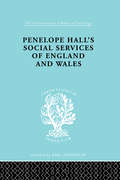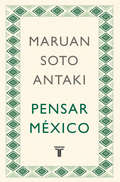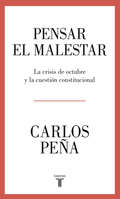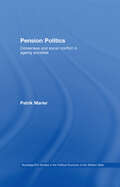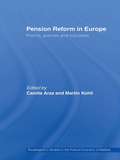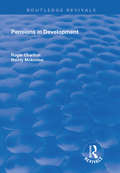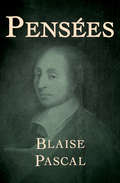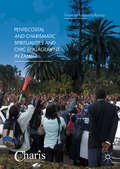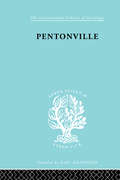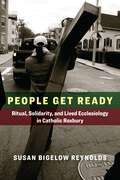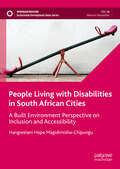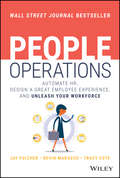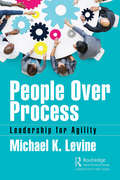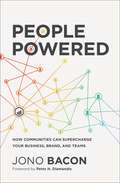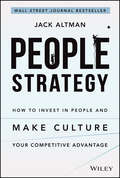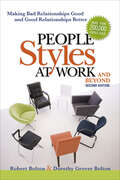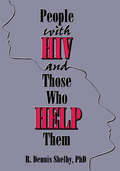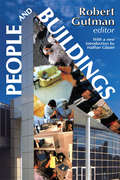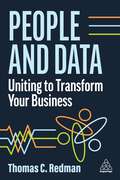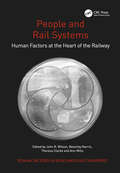- Table View
- List View
Penelope Hall's Social Services of England and Wales (International Library of Sociology)
by Anthony ForderThis is Volume VI of eighteen in a series on Public Policy, Welfare and Social Work. Originally published in 1969, this study is a revision of Penelope Hall's book (1952) from the Social Science Department at the University of Liverpool, deemed necessary to reflect changes like the creation of the Ministry of Social Security in 1966 and the White Paper on the Child, the Family and the Young Offender, which made it impossible to discuss services for the care of children without consideration of penal services for juveniles.
Pennsylvania Germans: An Interpretive Encyclopedia (Young Center Books in Anabaptist and Pietist Studies)
by Simon J. Bronner and Joshua R. BrownThis comprehensive encyclopedia—the first of its kind—maps out three hundred years of German history and culture in Pennsylvania and beyond.Winner of the CHOICE Outstanding Academic Title of the Choice ACRLDestined to become the standard reference on Pennsylvania Germans (also known as the "Pennsylvania Dutch"), this book is the first survey of this extensive American group in nearly seventy-five years. Nineteen broad interpretive essays written by a distinguished group of historians, anthropologists, sociologists, linguists, and folklorists tell the rich and nuanced story of Pennsylvania German history and culture. United by a distinct (and distinctly American) language, the Pennsylvania Germans have been slower to assimilate than other ethnic groups. This sweeping volume reveals, though, that the group is much less homogenous and isolated than was previously thought. From architecture, media, and farming techniques to food, folklore, and medicine, the Pennsylvania Germans and their descendants display a wide range of cultural variation. In Pennsylvania Germans, editors Simon J. Bronner and Joshua R. Brown broaden the geographical and social coverage of the group, touching both on Pennsylvanian communities and the Pennsylvania German diaspora, including settlements in Canada and Mexico. They also expand historical coverage of the Pennsylvania Germans to the twentieth and twenty-first centuries.Beautifully illustrated, this volume—while paying tribute to the historical and cultural legacy of the Pennsylvania Germans—is the most comprehensive book on the subject to date.Contributors: R. Troy Boyer, Simon J. Bronner, Joshua R. Brown, Edsel Burdge Jr., William W. Donner, John B. Frantz, Mark Häberlein, Karen M. Johnson-Weiner, Donald B. Kraybill, David W. Kriebel, Gabrielle Lanier, Mark L. Louden, Yvonne J. Milspaw, Lisa Minardi, Steven M. Nolt, Candace Perry, Sheila Rohrer, and Diane Wenger
Pensar México
by Maruan Soto Antaki¿Hemos construido un país de solucionólogos y comentócratas? ¿Por qué la violencia y la humillación parecen inherentes a nuestra historia? Pensar México es una verdadera radiografía cultural de nuestro país. En Pensar Medio Oriente, Maruan Soto Antaki plantea preguntas esenciales para entender el mundo árabe(¿arabe es sinónimo de islámico? ¿Es indisociable el Islam del terrorismo? ¿Qué tan profundas son las raíces de los conflictos?) Ahora, centra su atención en un ámbito más cercano: México. Para entender Medio Oriente, debíamos dirigir nuestra mirada al lenguaje, pues ahí está el corazón de la cultura árabe. En el caso de México, hay que hacer lo mismo. La forma como hablamos y como callamos los mexicanos dice mucho de quiénes somos. Soto Antaki cuestiona la difundida idea de que, en México, el significado de las palabras varía dependiendo del contexto (según esto, podríamos insultar con afecto o sin tener la intención de agredir). Esto no es así: el problema es que, al relativizar el lenguaje al grado en el que lo hemos hecho, hemos vaciado a las palabras de significado. Ley, corrupción, orden: son palabras que pueden querer decir todo y nada. Esta erosión de significado revela un problema realmente grave, dado que el lenguaje es el principal elemento civilizatorio y que las élites culturales de nuestro país parecen haber renunciado a construir discursos públicos, ya sólo se hablan a sí mismas.
Pensar Occidente (Pensar el mundo #Volumen 3)
by Maruan Soto AntakiOccidente es una ambigüedad que, sin embargo, se comporta como una definición. Su situación paradójica lo es tanto como las contradicciones que genera dentro y fuera de sí mismo. Occidente es una ambigüedad que, sin embargo, se comporta como una definición. Su situación paradójica lo es tanto como las contradicciones que genera dentro y fuera de sí mismo. Los dos libros que precedieron a éste, Pensar Medio Oriente y Pensar México, surgieron de las posibilidades de ver lo medioriental desde el otro lado del Atlántico, y de ver lo mexicano desde los confines del Mediterráneo, así como de la crisis y el conflicto en que se encuentran mis territorios de pertenencia. ¿Occidente vive una crisis que lleva a pensar en él bajo esos mismos términos? La primera distancia con lo occidental se tiene viviendo en Occidente. Occidente está descompuesto, pero me niego a claudicar en las perspectivas de democracia, República y libertad que un día se establecieron en él. El advenimiento de los ismos -nacionalismos, nativismos, extremismos, etcétera- es sólo uno de los fenómenos que me llevan a notar el rompimiento de los acuerdos sociales que un día creímos que estaban afianzándose. Creo que es necesario revisar qué sucede cuando la democracia entra en los terrenos de la indiferencia, cuando la posibilidad de convivencia multicultural se percibe como un riesgo que rechaza el aprendizaje del pasado y da cabida a la violencia. Maruan Soto Antaki
Pensar el malestar: La crisis de octubre y la cuestión constitucional
by Carlos PeñaEl malestar del Chile contemporáneo tiene rasgos peculiares, distintos a los de otros momentos de la historia. Y el riesgo de estos días es intentar apagarlo sin tener una conciencia clara de aquello que lo origina. ¿Qué ocurrió en octubre? ¿Es un rechazo a la modernización o un síntoma inevitable de la misma? ¿Qué asuntos deberá considerar el debate constitucional? Carlos Peña continúa en este libro el análisis que comenzó en Lo que el dinero sí puede comprar. Si en ese texto examinó la ambivalencia de la modernidad capitalista, sosteniendo que ella era una dialéctica de progreso y desilusión, ahora se detiene en las causas que explican el malestar y la violenta protesta que se manifestó en Chile a partir del viernes 18 de octubre. El principal problema público, dice, es que no existe una conciencia clara del mal que aquejaría a la sociedad chilena. Contribuir a identificarlo —evitando la moralización que abunda en la opinión pública— es el objetivo de este ensayo. Las tensiones entre un mundo cada vez más racionalizado y el anhelo de editar la propia vida; las luchas culturales entre las generaciones; el bienestar que incrementa la vivencia de la desigualdad; la disolución de los vínculos que produce el dinamismo del mercado y los procesos de individuación son algunos de los factores, explica el autor, que inciden en esta crisis. Sobre la base de ese diagnóstico analiza algunos de los importantes problemas que la sociedad deberá enfrentar.
Pension Politics: Consensus and Social Conflict in Ageing Societies (Routledge Studies in the Political Economy of the Welfare State)
by Patrik MarierPopulation ageing and slower economic growth have raised serious questions about the willingness and ability of governments to maintain current social policies. Within this new reality, discussions on the future of public pensions have been predominant in political debates across Europe. This book explains why certain countries have been able to radically transform their pension system while others have simply altered parameters. To answer this question an extensive comparative analysis, including more than 60 interviews, was conducted in Belgium, France, Sweden and the UK. This empirical data provides an interesting contrast between reforms. Parametric reforms have stemmed from the creation of pension administrations outside the traditional state apparatus in France and Belgium and the resulting inclusion of social partners; while the state administrations of Sweden and the UK where debates have been internalised have led to programmatic reforms. Two controversial findings of this book include an explanation for the lack of influence on the part of the labour movement in the 1994/98 Swedish reform and a rejection of arguments claiming that policy change will be minimal with coalition governments. Finally the conclusion seeks to extend the applicability of the model to other industrialized countries. This book will be of interest to students and scholars of public policy, specifically social policy, political economy, the welfare state and comparative politics.
Pension Reform in Europe: Politics, Policies and Outcomes (Routledge Studies in the Political Economy of the Welfare State #Vol. 10)
by Camila Arza Martin KohliThis new book provides a cross-country comparative analysis of the key issues shaping the latest pension reforms in Europe: political games, welfare models and pathways, population reactions, and observed and expected outcomes. Pension reform has been a top policy priority for European governments in the last decade. Ageing populations, changing labour market patterns and the process of European integration are the ‘irresistible forces’ pushing for reform throughout the region. The Political Economy of Pension Reform evaluates the political forces that make pension reform viable in different national and institutional contexts and the nature of political bargains, actors and cleavages surrounding policy change. The volume also examines the nature and outcomes of pension reform experiences in Europe, searching for a solution to the financial challenge posed by growing pension budgets. By addressing the nature of change, the pathways of reform, and the outcomes of the new pension mix in the region, the authors conclude with an analysis of people’s perceptions and attitudes towards pension policy and their acceptance or otherwise of different reform options. This book will be of interest to students and scholars of international political economy, European politics, and social policy.
Pensions in Development
by Roger Charlton Roddy McKinnonThis title was first published in 2001. Challenging conventional approaches to the delivery of sustainable "social protection" to the elderly in developing countries (DCs) and assessing their implications, this work discusses the appropriateness of the public management of funded systems in DCs with relatively large formal sectors. The combination of social assistance approaches to social protection for the elderly facilitates the formation of an original unbiased "pensions in development" approach. Arguing for expeditious implementation of non-contributory tax (or aid) financed universal old-age "pensions" provision in all DCs and advocating industry flexibility and inclusivity, the book provides a treatment of a growing issue in worldwide development.
Pensées
by Blaise PascalThe seventeenth-century philosopher and mathematician&’s influential treatise in support of religion. Blaise Pascal was not a gambler, but he posited one of the most famous wagers of all time: Every man&’s life is a bet against God. It is a wager that any man can win, however. Sacrifice earthly pleasures—drink, lust, sin, etc.—and a lifetime of happiness awaits, in this world or the next. Live every day as if God exists, and you can&’t lose. Pascal devised his wager in the seventeenth century, but the lessons written by this brilliant man ring true today. In this collection of fragments intended as a defense of Christianity, everything is up for debate. From the nature of love to the relationship between scientific inquiry and religious faith, Pascal shows that skepticism and devotion go hand in hand.
Pentecostal and Charismatic Spiritualities and Civic Engagement in Zambia (Christianity and Renewal - Interdisciplinary Studies)
by Naar M’fundisi-HollowayFor the past sixty years, the Pentecostal and Charismatic movement has played a major role in Zambia. In this book, Naar Mfundisi-Holloway explains the history of this development and its impact on civic engagement. She opens a discussion on church-state relations and explains how the church presented a channel of hope in the wake of the HIV/AIDS pandemic, despite having a history that eschewed civic engagement. In fact, the pandemic propelled the church to work alongside the state in the fight against the disease. Using interviews and historical analysis, this book provides valuable insight into how Pentecostal and Charismatic churches have effectively engaged matters of civic concern in Zambia dating from colonial times.
Pentecostals in America (Columbia Contemporary American Religion Series)
by Arlene Sánchez WalshPentecostalism is one of the most significant modern movements in global Christianity today. A mixture of ecstatic expression and earnest piety, metaphysical nuance and embodied spirituality, it is far more than the stereotype of a supernatural sideshow. In this presumably secular era, Pentecostalism continues to grow, adapting to a diverse religious marketplace and becoming more racially and ethnically diverse. Originally an American phenomenon, it is now a globe-spanning religion. In this book, Arlene M. Sánchez Walsh provides a thematic overview of Pentecostalism in America, covering Pentecostal faith and practices, gender and sexuality, race and ethnicity, trends and offshoots, and the future of American Pentecostalism. She also considers Pentecostalism’s spiritual lineages, examining colorful leaders, ordinary adherents, and prominent outliers, as well as its deep roots in American popular culture. She examines Pentecostalism as a narrative performance, aiming to explain what Pentecostalism is through the experiences and stories of its adherents. Sánchez Walsh treats this Christian movement with the critical eye it has often lacked, and places it in context within the larger narrative of American religious history. An indispensable introduction to Pentecostalism, rich with insights for experienced readers, Pentecostals in America is an essential study of a vibrant religious movement.
Pentonville: A Sociological Study of an English Prison (International Library of Sociology #Vol. 211)
by Terence Morris Pauline MorrisThis is Volume XIII of fifteen in a series on the Sociology of Law and Criminology. Originally published in 1963, this is a sociological Study of an English Prison.
People Analytics: Using data-driven HR and Gen AI as a business asset
by Cole NapperHow can you use people analytics to drive business performance? Why does a data-driven approach to HR add value and how can you achieve this? What role should AI play in a people analytics function?People Analytics has the answers. It is a practical guide for all mid-career HR professionals which explains how data, analysis and effective use of artificial intelligence can drive business performance and be built into every role. It outlines every aspect of people analytics and explains how to use each element to add value in all parts of the business. There is also detailed discussion of the potential gains that can be made through the use of effective integration of people analytics and generative AI. This book offers guidance on how to build the data infrastructure for HR, the importance of high-quality data and step-by-step advice on how to analyse people data confidently so that you can improve business performance. There is also essential discussion of the ethics of using people analytics and artificial intelligence at work and real-world examples from companies including Toyota, PepsiCo, Lightcast, Booster and FedEx. Written by a leading voice in the people analytics space, this is essential reading for all HR professionals needing to understand the power of people analytics.
People Get Ready: Ritual, Solidarity, and Lived Ecclesiology in Catholic Roxbury (Catholic Practice in the Americas)
by Susan Bigelow ReynoldsWINNER, COLLEGE THEOLOGY SOCIETY 2024 BEST BOOK AWARDWhat does it mean to be a community of difference?St. Mary of the Angels is a tiny underground Catholic parish in the heart of Boston’s Egleston Square. More than a century of local, national, and international migrations has shaped and reshaped the neighborhood, transforming streets into borderlines and the parish into a waystation. Today, the church sustains a community of Black, Caribbean, Latin American, and Euro-American parishioners from Roxbury and beyond. In People Get Ready, Susan Reynolds draws on six years of ethnographic research to examine embodied ritual as a site of radical solidarity in the local church. Weaving together archived letters, oral histories, stories, photographs, newspaper articles, and newly examined archdiocesan documents, Reynolds traces how the people of St. Mary’s constructed rituals of solidarity as a practical foundation for building bridges across difference. She looks beyond liturgy to unexpected places, from Mass announcements to parish council meetings, from the Good Friday Via Crucis through neighborhood streets to protests staged in and around the church in the wake of Boston’s 2004 parish shutdowns. Through ethnography and Catholic ecclesiology, Reynolds argues for a retrieval of Vatican II’s notion of ecclesial solidarity as a basis for the mission of the local church in an age of migration, displacement, and change.It is through the work of ritual, the story of St. Mary’s reveals, that we learn to negotiate the borders in our midst—to cultivate friendships, exercise power, build peace, and, in a real way, to survive.
People Living with Disabilities in South African Cities: A Built Environment Perspective on Inclusion and Accessibility (Sustainable Development Goals Series)
by Hangwelani Hope Magidimisha-ChipunguThis book offers a unique and much-needed perspective on disability and accessibility in urban context in South Africa. Drawing on lived experiences of disabled people, it documents the multidimensional aspect of poverty in the context of disability and built environment to show how poorly planned cities create physical and social barriers that impact the life of people with disabilities. People Living with Disabilities in South African Cities is structured around three main insights and themes that inform the author's approach to disability and cities. The first is disability research; drawing on studies on planning and the built environment, the author highlights the role of physical environment in promoting inclusion and accessibility for people with disabilities. The second theme is social protection, i.e. ways to provide support and resources for people with disabilities to enable them to participate fully in society. Finally, the author explores the policies and legislative context needed to create an inclusive society, challenging the role of governments and policy makers. Offering a comprehensive approach to studying disabilities and cities, the author aims to bridge the gap between disability studies, inclusive planning, and design to support the development of accessible cities in the African context. This invaluable book not only raises awareness on social inclusion, but also offers an invaluable guide to policy makers across the Global South to tackle and address inequalities.
People Operations: Automate HR, Design a Great Employee Experience, and Unleash Your Workforce
by Jay Fulcher Tracy Cote Kevin MarascoHow the Best Companies are Skipping HR and Winning the Future of Work with People Ops People Operations: Automate HR, Design a Great Employee Experience, and Unleash Your Workforce explains how leaders at small- and medium-sized businesses can stop spending time on HR administration—"paperwork"—and start focusing on the "peoplework" that truly fuels employee growth and productivity. Authors Jay Fulcher, Kevin Marasco, Tracy Cote of Zenefits, the leading people operations platform, provide readers with a playbook for creating a massive competitive advantage by eliminating antiquated approaches to HR. The book takes a look at how work has changed and what companies need to do about it, and the new approach they must take to processes, systems, and best practices. You'll learn how to eliminate busywork and hassle, and how to use that newfound time and capital to empower your biggest asset: your people. You'll receive the end-to-end guide to: Digitizing legacy HR functions Using robots for the busywork you hate Employing software to design and improve your employee experience Assembling and empowering your "people team" Utilizing the included plans and templates to guide each stage of your business transformation Perfect for managers, leaders, small business owners, and executives, People Operations is perfect for anyone who wants to optimize HR, maximize their workforce investment, support their employees, and modernize their business.
People Over Process: Leadership for Agility
by Michael K. LevineThis book is about improving and sustaining agility by focusing on people over process, as the first agile value advocates, and is the third and final book in the author's Lean and Agile Software trilogy. The first – A Tale of Two Systems: Lean and Agile Software Development for Business Leaders – describes what agile is and why we do it. The second – A Tale of Two Transformations: Bringing Lean and Agile Software Development to Life – guides leaders in transforming their organizations to adopt this approach. All three books mix description and elaboration of theory with practical demonstration in fictional companies and projects. This new, third book – People over Process: Leadership for Agility – presents a model of facilitative leadership for agility, which informs the entire book. It begins by describing the roots of the agile movement, which motivates the centrality of people and the need for leadership. The leadership model is then presented, very simply: rigor, alignment, efficiency, through frameworks. Leadership is considered for all team members, and then for the special case of the responsibilities of leaders in formal positions of organizational authority. With this strong background presented, the book proceeds to describe and demonstrate common and highly useful frameworks for agility. The fictional Pacifica Bank is introduced, and we see the Pacifica team work through architecture, project planning, team structure, governance, scrum meeting, and ultimately retrospectives, using frameworks that have been presented. An Appendix summarizes the most useful frameworks for future reference. Throughout the book concepts are illustrated with vignettes from my experience (in the didactic sections) and with the Pacifica fictional case study. The key benefits of the book are to make everyone involved in agile work more effective and fulfilled. Essentially, since agile was first introduced almost two decades ago, the primary focus in practice has been on process. The "scrum" methodology was developed and promulgated, and has been widely adopted. This has been on balance broadly positive, but as an industry we have progressed to the point where following the steps of a methodology, particularly one that seeks to implement concepts where the first value is "People over Process," has reached its limits. The reader of this book: • Gains a powerful, simple model of leadership that enables the "People" in "People over Process;" • Sees these principles in action in a fictional company, making agile leadership understandable and engaging; • Improves their ability to participate in and lead agility; • Learns extraordinarily useful "frameworks" that help in the most important activities in agile software. In short, the reader will be better at delivering valuable software solutions, more valuable to their organizations, and more fulfilled in their work.
People Powered: How Communities Can Supercharge Your Business, Brand, and Teams
by Jono BaconWhat if you discovered a blueprint that could grow your brand&’s reputation and loyalty, dramatically reduce customer service issues, produce content and technology, and cement a powerful, lasting relationship between you and your customers?Communities have been a popular topic since the rise of the Internet and social media, but few companies have consistently harnessed their power, driven tangible value, and effectively measured their return on investment (ROI) like Salesforce.com, Star Citizen via Kickstarter, and Red Hat. Companies such as PayPal, Facebook, Bosch, Microsoft, CapitalOne, and Google, have also built communities inside their organizations, which have fostered innovation, broken down silos, and helped their organizations to operate more efficiently and collaboratively.People Powered helps C-suite leaders, founders, marketers, customer advocates, and community leaders gain a competitive advantage by answering the following questions: What is the key value proposition of building a community?What kind of community do we need and how do we build and integrate it into our organization?How do we incentivize and encourage people to get involved, build reliable growth, and keep community members engaged?How do we develop authentic, productive relationships with community members both online and in person?How do we get departmental buy-in, hire effectively, and create consistent, reliable community engagement skills in our organization?What are the strategic and tactical pitfalls and roadblocks we need to avoid?How do we make sure that our community continues to grow with us—and more importantly, how do we make sure that we continue to grow with them?People Powered pulls together over 20 years of pragmatic experience into a clear, simple methodology and blueprint to not just answer these questions, but deliver results.Don&’t get left behind—become an industry trailblazer and ensure your company&’s longevity by tapping into the most dynamic force both outside and inside your organization: the people.
People Strategy: How to Invest in People and Make Culture Your Competitive Advantage
by Jack AltmanLearn to unlock the potential of your employees and colleagues with this definitive resource for people management People Strategy: How to Invest in People and Make Culture Your Competitive Advantage provides readers with a powerful framework in which to develop high-performing teams, increase employee motivation, and use data to build an inviting and effective company culture. Author Jack Altman, cofounder and CEO of Lattice, an award-winning HR and performance management platform, shows you how to: Establish the values that will form the bedrock of your organization Develop feedback processes that help employees feel heard, supported, and equipped to succeed Monitor the breadth and depth of employee engagement in your company Use the data and insights created by your People Strategy to drive business results Perfect for executives, managers, and human resource professionals, People Strategy also belongs on the bookshelves of anyone with even an interest in how to develop, nurture, and unlock the potential of their employees and colleagues.
People Styles at Work and Beyond: Making Bad Relationships Good and Good Relationships Better
by Robert Bolton Dorothy Grover BoltonAs cofounders of the leadership coaching and training firm Ridge Associates, authors Robert Bolton and Dorothy Grover teach that good interpersonal communication is essential to getting things done.In this comprehensive and practical guide, they offer a proven method for understanding the key behavioral styles of those around you (including your own) and explain how you can leverage the strengths and weaknesses of each to relate to others more winsomely.People Styles at Work . . . and Beyond teaches you how to:recognize how they come across to other coworkers;read others' body language and behavior to identify the best ways to work with them;make small adjustments that will dramatically increase the quality and productivity of their interactions;find common ground with different people while retaining their individuality;relate less defensively and more effectively no matter how others act.At work, at home, and even while you&’re out running errands, your ability to relate to others affects how well you get things done. This book provides a self-assessment to determine which style you are and then uses that information to gauge how you should interact with others.Now including all new material on personal relationships, parenting, and more, People Styles at Work . . . and Beyond is the ultimate how-to guide that can help you avoid conflicts and enhance important relationships.
People With HIV and Those Who Help Them: Challenges, Integration, Intervention
by Carlton Munson R Dennis ShelbyIn this guidebook, People With HIV and Those Who Help Them, author Dennis Shelby uses the reported experiences of HIV-positive men to chart the course of living with HIV. He offers a consistent clinical-theoretical framework that encompasses the vast range of clinical problems clinicians may encounter in their work with HIV-positive individuals across the span of infection.This book provides a detailed account of the many psychological transformations that infected people experience. People With HIV and Those Who Help Them enables clinicians and students to better address the problems commonly encountered in clinical practice with persons with HIV. Clinicians will be able to gain perspective on the process of knowing one is infected, infected men will see their process mirrored and validated, and family, friends, and partners of infected men will gain a greater appreciation for the experience of their relative, friend, and partner. As clinicians have gained experience in working with HIV-positive people, they have become increasingly aware of the complexity of successful clinical intervention with HIV-related problems. In his book, Shelby “breaks down” this complex process into its component aspects: psychological impact of HIV infection the process of adapting to the knowledge of infection the dynamic process involved with HIV infection common problems and solutions encountered by infected people case examples that illustrate the clinical framework intensive psychotherapy and HIV infectionThe study that is the basis for this book charts the initial psychological impact and many changes and transformations of the experience of being HIV-positive. While infected people are often encouraged to maintain hopeful outlooks and to think of themselves as living with HIV rather than dying from it, it is often a long and arduous process to achieve and maintain this perspective. People With HIV and Those Who Help Them is a guide to help those with HIV to keep a positive outlook on life.
People and Buildings
by Robert GutmanThere is at the present time a continuing interest in relating the behavioral sciences to design disciplines. Sociologists and social psychologists have been added to faculties of architecture schools, where they off er seminars and participate as programming specialists and design critics in studio courses. Behavioral scientists in many European countries have collaborated with architects and planners in design work undertaken by governmental ministries, and more recently have been participating in the work of private design fi rms. Similar developments are now common in the United States.In this fascinating study of the "ecology of buildings," biologists, anthropologists, sociologists, psychologists, and architects analyze the effect of working and living spaces on human behavior. Focusing on such contemporary social problems as the influence of the physical environment on psychological stress, mental illness, family disorganization, urban violence, and delinquency, the contributors show that we must respect the constraints that the environment and the nature of man impose on human adaptability.The selections in People and Buildings have been written primarily by scientists and designers working in the behavioral mode. The selections within each part have been arranged to provide an ordered argument or exploration of the general topic with which the part as a whole deals. To facilitate the reader's appreciation of the argument, each selection is preceded by a short prefatory statement. In view of the fact that a single article or preface can hardly be representative of the depth of the literature that has developed around an argument, Gutman has included an annotated bibliography, which is keyed to the selections through the use of subheadings. A new introduction by Nathan Glazer has been prepared for this edition.
People and Data: Uniting to Transform Your Business
by Thomas C. RedmanPeople and Data is an innovative exploration of the relationship between non-data professionals and data in an organization's success, and why it is only when they work together that a business can unlock its full potential.This book explains how most companies are yet to take advantage of the value that data offers. Their structures and processes are unfit for data and their biggest mistake is that regular employees are not included in the data-driven effort. People and Data illustrates how to change this. It shows how and why improving data quality should be an organization's first priority, how to tackle the tough organizational issues, such as departmental silos, that get in the way and how to upskill the whole workforce to get the best out of the organization's data. It is a practical guide written by a global expert which explains how companies can put their data to work by building it into all aspects of the business including their structure, culture and workforce design. By infusing the whole organization with data in this way employees at any level can use insights from the data to improve business performance. Full of practical tips and advice, People and Data includes a Resource Centre featuring a curriculum for training employees, and eight tools that will help companies to leverage their data to meet their business goals and upskill their employees so that everyone can benefit from the power of data. With important takeaways and real-world examples from organizations including AT&T and Morgan Stanley, this book is essential reading for all those wanting to allow their people and data to reach their full potential but are not sure where to start.
People and Products: Consumer Behavior and Product Design
by Allan J. KimmelBy examining the interface between consumer behavior and new product development, People and Products: Consumer Behavior and Product Design demonstrates the ways in which consumers contribute to product design, enhance product utility, and determine brand identity. With increased connectedness and advances in technology, consumers and marketers are more closely connected than ever before. Yet consumer behavior texts often overlook the application of the subject to product design, testing, and success. This is the first book to explore this interface in detail, exploring such issues as: the attributes and qualities that consumers demand from products and services, and social and cultural forces to be aware of; design and form and how they facilitate product usage; technological developments and the ways they have changed how consumers interact with products; product disposal and sustainability; emerging and future trends in consumer behavior and product development and design. This exciting volume is relevant to anyone interested in marketing, consumer behavior, product development, technology, engineering, design, and brand management.
People and Rail Systems: Human Factors at the Heart of the Railway (Human Factors in Road and Rail Transport)
by John R. Wilson Beverley Norris Ann MillsFollowing on from 2005's Rail Human Factors: Supporting the Integrated Railway, this book brings together an even broader range of academics and practitioners from around the world to share their expertise and experience on rail human factors. The content is both comprehensive and cutting-edge, featuring more than 55 chapters addressing the following topics: ¢ Passengers and public ¢ Driver performance and workload ¢ Driving and cognition ¢ Train cab and interfaces: simulation and design ¢ Routes, signage, signals and drivability ¢ Signalling and control of the railway ¢ Planning for the railway ¢ Engineering work and maintenance ¢ Level crossings ¢ Accidents and safety ¢ Human error and human reliability ¢ SPADs: signals passed at danger ¢ Human factors integration and standards ¢ Impairments to performance ¢ Staff competencies and training. People and Rail Systems: Human Factors at the Heart of the Railway will be invaluable for all those concerned with making railways safer, more reliable, of higher quality and more efficient. It will be essential reading for policy-makers, researchers and industry around the world.
